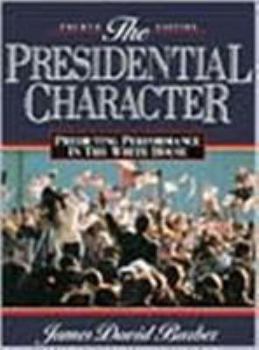Presidential Character: Predicting Performance in the White House
Select Format
Select Condition 
Book Overview
A book entitled The Presidential Character is more timely and necessary than ever. This new issue of James David Barber's classic work appears almost 50 years after its first publication and yet reads... This description may be from another edition of this product.
Format:Paperback
Language:English
ISBN:013718123X
ISBN13:9780137181230
Release Date:January 1992
Publisher:Prentice Hall
Length:522 Pages
Weight:0.30 lbs.
Dimensions:1.0" x 7.0" x 9.2"
Customer Reviews
2 ratings
Marge Ware
Published by Thriftbooks.com User , 16 years ago
This is a fascinating book that was recommended to me by John Dean, former white house counsel to Richard Nixon. Barber breaks down presidents into four different categories; Aggressive-Positive, Aggressive-Negative, Passive-Positive & Passive-Negative. He explains which category different presidents fell into and how it affected their presidency. This is a great book to read particularly with a new president coming into office. Unfortunately Barber has passed away but I would have loved to hear what he had to say about W.
Putting the American President on the psychiatrist's couch
Published by Thriftbooks.com User , 23 years ago
This is an incredibly fascinating book for those interested in the history of the American Presidency and particularly of the occupants of that office. Mr. Barber analyzes the presidents by two main factors: activity (how much effort a particular president put into performing his job) and the president's personality type and world-view (whether a president viewed his role in the world in a positive or negative light). From this Mr. Barber theorizes that there are four major presidential types: active-positive, active-negative, passive-positive, and passive-negative. By analyzing an individual's personality prior to his entry into the White House, Mr. Barber suggests that one can predict his performance while in the presidency. For example, he categorizes FDR, JFK, and Truman as active-positives (high activity while president with each having a positive view of the world), Taft, Harding and Reagan as passive-positives (low effort put into performance of their duties, while trying to show a positive, if timorous, face to the world), and Coolidge and Ike as passive-negatives (each viewing his role in the presidency as a duty to perform rather than something in which to look forward).The best parts of the book are in which Mr. Barber talks about the active-negative presidents, all of whom have proved disastrous to the office. Each of these presidents had put much effort and personal investment into the performance of his duties, but without any enjoyment. For each of these men, life has always been a struggle and the personal rewards few. Compulsiveness and anxiety was each man's life-script. None of them could ever afford to rest on his laurels after some success, because if he did so, he would only have to re-double his efforts next time for fear of committing failure. None could admit error and saw compromise with his opposition something to avoid at all costs. All became frozen in the rightness of a certain policy line. This was despite all evidence showing that policy had long been proven a failure.Woodrow Wilson would not compromise with opposition Republican Senators who had certain reservations about the U.S. becoming a member of the League of Nations. The result was that the League treaty was voted down, the U.S. never became a member, and America entered a generation of isolationism. World War II was the final outcome. Herbert Hoover, sticking to his belief in "rugged individualism," would not modify his opposition to the government's stepping in to ameliorate of the effects of the Great Depression. By the time Hoover put forth his Reconstruction Finance Corporation proposal to provide loans to some businesses, the financial and unemployment crisis in the country seemed beyond repair. The voting public was ready to dump the seemingly heartless and "inactive" Hoover (who was really anything but) for the more positive and hopeful FDR. Lyndon Johnson persisted in sending more and more troops into the Vietnam quagmire despite al






